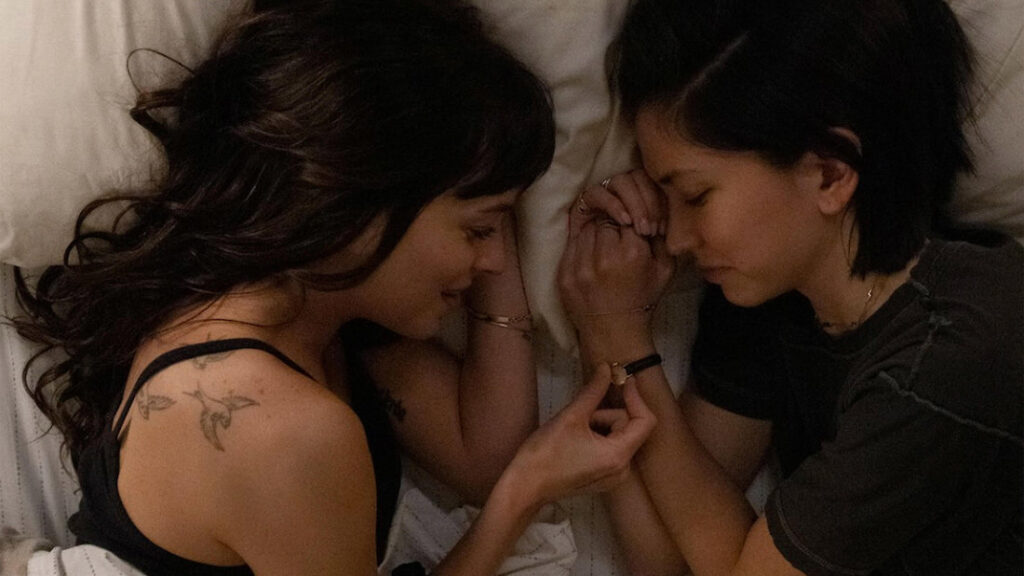This past Sundance felt like it was particularly slim on the comedic pickings, across categories, and yet comedy provided some of this year’s highlights in paired performances. Two of the movies talked about here, from the Premieres section, were powered by the couples at the center, whether it was about embracing their bond or trying to comment on it.
One of the sweetest friendships from this year’s festival had to be from Dakota Johnson and Sonoya Mizuno in “Am I OK?”, playing two best buddies in their 30s going through some life changes that also involve them being apart. Jane (Sonoya Mizuno) has accepted a job offer in London, which upsets her friend Lucy (Dakota Johnson). Meanwhile, Lucy is facing a realization that she is a lesbian, startled that she hadn’t embraced it before. The tension about Jane leaving, with Jane also being too pushy about getting Lucy out into the world, creates a deep conflict that threatens their last few weeks together. Throughout the ups and downs of this friendship as we see it, Mizuno and Johnson have dazzling chemistry, the way that Mizuno’s Jane is so elastic while Johnson’s Lucy is more calculated, reserved, afraid.
Co-directed by Tig Notaro and Stephanie Allynne and written by Lauren Pomerantz, “Am I OK?” is mighty thoughtful in how it covers certain territories about being in your 30s, and watching things change that you thought might be the same. Simultaneously, it tells a sincere story about Lucy’s process of feeling her way through nervous events, like a date she has with a radiant masseuse played by Kiersey Clemons. The movie’s humor can be a little more hit and miss despite all its promise—more new-age jokes from indies—but “Am I OK?” has a winning sweetness. It makes one further appreciate the true love that is friendship, even when we know that someone may not always physically be in our lives.

A true power couple of Sundance could be found in “Honk for Jesus. Save Your Soul.,” a sharp mockumentary that goes to heavier, darker places than Christopher Guest ever has or could. That journey is made possible by Regina Hall and Sterling K. Brown, who are fantastic as the cavernous leaders of a massive Southern Baptist Mega Church. They are trying to bounce back from a scandal that require them to step out of the limelight, and lose their parishioners, AKA their cash flow.
Written and directed by Adamma Ebo, the movie is a pretty incisive look at churches as a business, showing the type of gaudy narcissism and power moves behind creating their audience. It’s the messenger doing whatever they can to make you buy the message. The one problem is that it’s working with fairly easy targets—pointing out Lee-Curtis’ fixation on material items is not the eye-opening statement it wants to be—but again it comes back to the performances. Hall and Brown help us perceive the many masks of these people, and Hall is especially good at the razor-sharp “bless your heart” niceness that has her fighting for pride and an image. Brown gets some great comedy out of his intensity, but is also able to let the true pain shine through. The best moments in “Honk for Jesus. Save Your Soul.” can hit you in the gut—like a laugh, or a knife.

Premiering as part of the festival’s NEXT section, co-writer/director Alika Tengan’s “Every Day in Kaimukī” is a particularly laid back story about a guy in Hawaii, Naz (co-writer Naz Kawakami), who is preparing for a big change. He’s decided to relocate to New York City, because if it doesn’t happen now it never will. The move includes such big stakes as relocating with his live-in girlfriend, safely transporting his beloved cat, leaving behind his skater buddies, and also moving on from the radio job that has provided him a type of home. He has a good taste in music, and so too does this movie.
“Every Day in Kaimukī” has Naz face these problems in its low-key narrative while holding back on making it funny or involving. His friends make bets about whether he will leave or not, and the news of this creates a conflict that is so minor it might as well not have even happened. The film is very much about a vibe, though while it has plenty of gorgeous Hawaiian scenery for atmosphere, the style that could bring you in isn’t there. And the story overall isn’t as interesting as Naz packs up the pieces of his life; it wants to be observational, but instead feels procedural.
There’s some ambition to be found in the filmmaking choices here, as one hopes to find in a movie from this section about upcoming filmmaking talent at Sundance. Take for example one sequence that’s devoted to watching Naz go down the stairs from his second floor apartment, then go back up to let people inside, and then go back down, and then go back up. There’s no immense purpose to this scene, but it does make you want to know more about how that filmmaker thinks. And to devote this energy to such a scene is intriguing, parallel with the film’s skateboard scenes. It’s more that when it comes down to how to use this energy to make us feel for Naz, the movie seems kinda lost.












